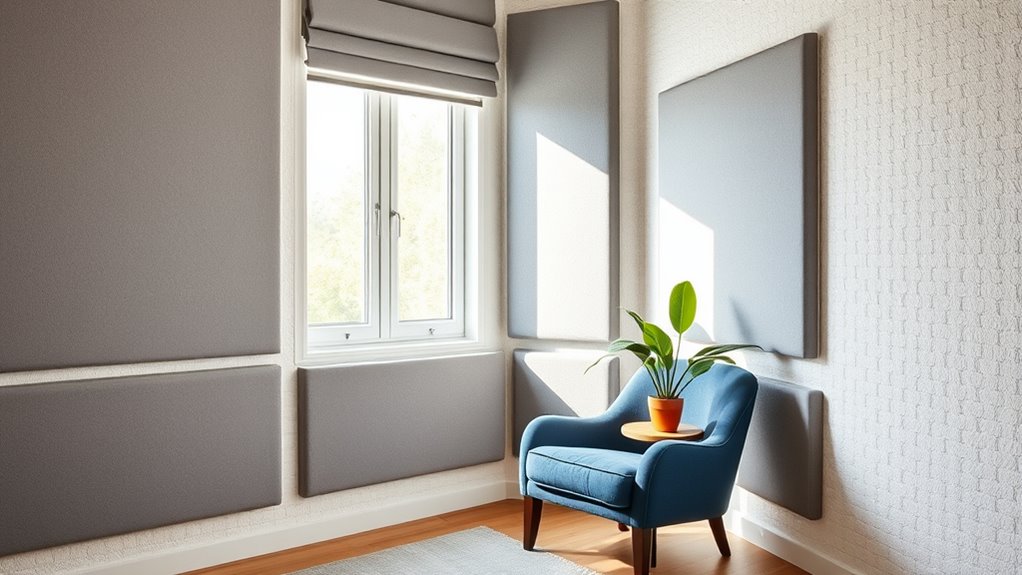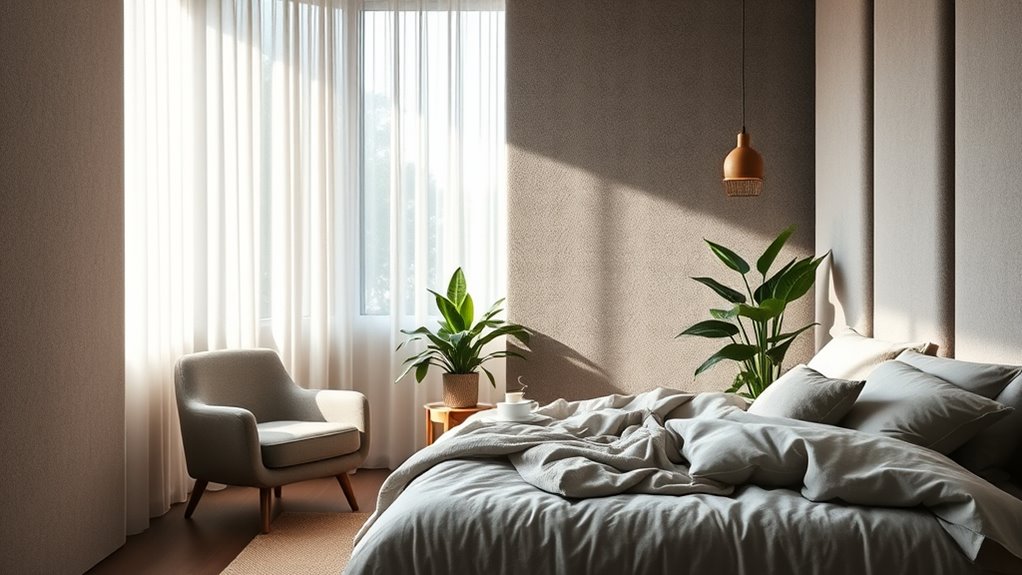Soundproofing your room reduces noise pollution, which can lower stress, improve sleep, and enhance your overall health. By minimizing disruptive sounds, you’ll experience better mental clarity, less anxiety, and more restful nights. It also helps protect your hearing and boosts focus during work or relaxation. Creating a quiet environment supports both your physical and emotional well-being. If you want to discover eco-friendly methods and practical tips, you’ll find more helpful insights ahead.
Key Takeaways
- Soundproofing reduces noise-induced stress and anxiety, promoting emotional stability and mental calmness.
- Creating a quiet space improves sleep quality, leading to better cognitive function and emotional regulation.
- Noise reduction enhances focus, productivity, and creativity by minimizing distractions and mental fatigue.
- Eco-friendly soundproofing materials support overall health, indoor air quality, and environmental sustainability.
- A peaceful environment fosters self-awareness, relaxation, and resilience, positively impacting mental and physical well-being.
The Connection Between Noise Pollution and Mental Health

Since noise pollution is a pervasive issue, it directly affects your mental health in several ways. Exposure to constant noise increases anxiety, depression, and psychological distress, making it harder to stay calm and focused. It also disrupts your sleep patterns, leading to poor cognitive function and difficulty managing emotions. Chronic noise exposure raises your risk of stress-related health problems like hypertension and mental fatigue. Studies reveal that about 89% of people report negative effects of noise pollution on their mental health, showing how widespread this issue is. When noise levels are high, your mood can decline, and your ability to handle daily stress diminishes. Addressing noise pollution is vital for protecting and improving your mental well-being. Soundproofing techniques can significantly reduce these negative impacts, promoting a calmer and healthier environment. Implementing sound vibrations through effective soundproofing can further enhance your overall sense of peace and relaxation. Additionally, incorporating acoustic treatments like panels and insulation can help block and absorb disruptive noise sources, contributing to a more tranquil space. Using high-quality soundproofing materials can ensure long-term effectiveness and durability in noise reduction efforts. Moreover, advancements in automation technologies in soundproofing systems are making it easier to customize solutions for varying noise challenges.
Benefits of Creating a Quiet Space for Well-Being

Creating a quiet space in your environment offers numerous benefits for your mental and physical well-being. Soundproofing reduces stress by minimizing noise-induced psychological distress, helping you feel calmer and more centered. A serene environment improves sleep quality, which boosts mental clarity and emotional stability. Silence fosters self-awareness, enhances creativity, and sharpens problem-solving skills by lowering overstimulation. Additionally, reducing noise pollution helps regulate cortisol levels, supporting overall health. When your space is peaceful, you can focus better and concentrate more effectively, leading to increased productivity and emotional resilience. By creating a quiet environment, you actively promote better mental and physical health, making it easier to handle daily challenges and enjoy a more balanced, peaceful life.
How Soundproofing Enhances Sleep Quality and Recovery

Soundproofing your room considerably enhances sleep quality by reducing ambient noise, allowing you to experience uninterrupted rest. When noise levels drop by up to 90%, your sleep becomes more consistent, preventing disruptions caused by sounds over 40 decibels that fragment sleep cycles. This improvement can lead to a 30% increase in sleep duration and overall quality. Less external noise also lowers cortisol levels, reducing stress and helping your body recover faster during sleep. A quieter environment supports deeper, more restorative sleep, which benefits your mental and physical health. Additionally, AI-driven solutions are increasingly being used to optimize soundproofing techniques for personalized comfort. Using effective soundproofing materials can further enhance noise reduction and create an ideal sleep environment. Proper environmental considerations and careful campsite selection can also contribute to minimizing disturbances and improving sleep quality. Incorporating spiritual principles such as gratitude and mindfulness can further promote relaxation and better sleep. Staying informed about the latest technology trends in soundproofing can help you choose innovative products that enhance your sleep environment. By minimizing noise disturbances, you create a space where your body can fully recover and rejuvenate, making soundproofing a crucial step toward better sleep and enhanced well-being.
Effective Techniques for Soundproofing a Room Sustainably

To soundproof your room sustainably, start by choosing eco-friendly materials like cork or recycled cellulose, which absorb sound naturally and have minimal environmental impact. Next, explore innovative techniques, such as installing recycled fabric panels or using natural insulation, to enhance soundproofing without chemicals. Additionally, incorporating sound absorption properties during installation can help reduce stress and improve focus, making the process more enjoyable. For example, selecting materials with high acoustic performance can maximize effectiveness while maintaining sustainability. Incorporating soundproofing techniques that utilize renewable resources can further reduce your environmental footprint. Finally, adopt sustainable installation practices that reduce waste and energy use, ensuring your efforts benefit both your space and the environment.
Eco-Friendly Materials Selection
Choosing eco-friendly materials for soundproofing your room not only reduces environmental impact but also guarantees healthier indoor air quality. Cork stands out as an excellent option due to its natural, renewable qualities and impressive sound-absorbing properties. Harvested from the bark of cork oak trees, cork is sustainable because it can be harvested without harming the tree, ensuring continual growth and renewal. Its porous structure effectively dissipates sound energy, providing noise reduction while maintaining the environment’s health. Unlike synthetic alternatives, cork is biodegradable, recyclable, and free from harmful chemicals, making it a responsible choice for eco-conscious construction. Incorporating sustainable materials into your design supports environmentally friendly practices and helps reduce your carbon footprint. Using biodegradable options can further enhance the eco-friendly aspect of your soundproofing project. Selecting such eco-friendly materials supports sustainable practices and contributes to a cleaner, healthier indoor environment, which can improve your overall well-being. Additionally, choosing environmentally friendly soundproofing options can align with your values of reducing environmental impact and promoting a healthier planet. Furthermore, utilizing natural soundproofing materials can enhance the acoustic performance without compromising sustainability.
Innovative Soundproofing Techniques
Incorporating innovative, sustainable soundproofing techniques can markedly enhance your room’s noise reduction while minimizing environmental impact. You can use eco-friendly materials like cork and recycled insulation, which absorb sound effectively and reduce waste. Sustainable acoustic panels made from natural fibers are easy to install and removable, protecting your surfaces. Combining natural materials with traditional methods boosts both effectiveness and sustainability. To help you compare options, consider this table:
| Material/Technique | Environmental Benefits | Soundproofing Effectiveness |
|---|---|---|
| Cork panels | Renewable, biodegradable | High |
| Recycled insulation | Reduces waste, eco-friendly | Moderate to high |
| Plant-based acoustic barriers | Promotes green living | Effective |
| Natural fiber insulation | Biodegradable, recyclable | Good |
These innovative soundproofing techniques support a greener, quieter space. By choosing natural fiber insulation, you further enhance the eco-friendly aspect of your soundproofing project. Additionally, understanding the soundproofing effect of different materials can help you select the most effective solution for your needs.
Sustainable Installation Practices
Implementing sustainable installation practices is vital for maximizing your room’s noise reduction while minimizing environmental impact. Start by choosing eco-friendly soundproofing materials like cork or recycled textile-based panels, which effectively absorb sound without harming the planet. Use natural insulation options such as cellulose or sheep’s wool to boost sound absorption sustainably. Proper installation techniques, including sealing gaps with eco-conscious adhesives, are essential for ideal acoustic performance and sustainability. Incorporate renewable materials like bamboo or hemp-based panels with high R-values to guarantee effective soundproofing and environmental responsibility. Selecting certified, low-VOC, biodegradable products not only supports eco-friendly building practices but also improves indoor air quality. These sustainable installation practices help you create a quieter, healthier space with a smaller ecological footprint.
The Psychological and Physical Advantages of Reduced Noise

When you reduce noise in your space, you create a calmer atmosphere that eases stress and boosts mental clarity. This quieter environment also supports better sleep and physical health by lowering cortisol levels and protecting your hearing. In turn, these benefits help you feel more alert, focused, and healthier overall.
Enhanced Mental Clarity
Reducing noise levels in your room considerably boosts mental clarity by lowering mental fatigue and sharpening your focus. Noise pollution hampers cognitive functions, making it harder to concentrate and problem-solve. Soundproofing creates a calm environment that fosters better concentration and supports creative thinking. When external sounds are minimized, your mind can process information more efficiently, leading to clearer thinking and improved memory retention during the day. Lower ambient noise also reduces psychological distress, helping you stay relaxed and alert. Scientific studies show that a quieter space increases brain activity associated with alertness and mental sharpness. As a result, your overall mental well-being improves, enabling you to perform tasks more effectively and experience a greater sense of mental clarity throughout your day.
Better Physical Health
Lowering noise levels in your room offers significant benefits for both your psychological and physical health. You’ll notice better sleep, which is essential for your body’s recovery and immune function. Reduced noise also prevents you from speaking louder, helping protect your hearing and maintain healthier auditory function. Importantly, soundproofing minimizes chronic stress caused by persistent environmental noise, which supports cardiovascular health and lowers blood pressure. Less stress from environmental noise reduces the risk of long-term health issues like hypertension and heart disease. Vulnerable populations, such as the elderly or patients, benefit from quieter spaces that promote physical well-being. Overall, creating a quieter environment not only enhances your mental clarity but also contributes to better physical health by reducing stress and supporting critical functions like sleep and blood pressure regulation.
Practical Steps to Improve Your Environment and Mental Clarity

Creating a quiet environment begins with practical steps you can take to block out unwanted noise. Soundproofing is essential since noise can cause stress, distraction, and fatigue. Start by installing acoustic panels or insulation, which can reduce ambient noise by up to 90%, creating a calmer space. Using white noise devices or sound barriers around your room helps mask external disturbances, boosting focus and mental clarity. Upgrading windows and doors with noise-reducing features can cut outdoor sound infiltration by as much as 50%. Combining strategies like wall insulation and door seals enhances overall noise reduction. Regularly maintaining and evaluating your soundproofing efforts ensures these benefits last, supporting your mental well-being and providing a peaceful, focused environment.
Frequently Asked Questions
How Does Noise Affect Wellbeing?
Noise affects your wellbeing by increasing stress and causing psychological distress, which can lead to anxiety and depression. It disrupts your sleep, making you feel tired and less focused during the day. Even moderate noise levels can interfere with your mental clarity and emotional stability. When you reduce ambient noise, you’ll notice improved sleep, better concentration, and a more balanced mood, boosting your overall mental health.
What Are the Benefits of Soundproofing?
Think of your room as a sanctuary, where soundproofing acts like a calming forest clearing. It reduces noise, helping you feel more relaxed and less stressed. You’ll sleep better, wake refreshed, and find it easier to focus. With less external chaos, your mind clears, boosting your mood and lowering anxiety. Overall, soundproofing creates a peaceful space that supports your mental health and promotes a balanced, healthier life.
What Happens if You Stay in a Soundproof Room?
When you stay in a soundproof room, you’ll notice a significant drop in external noise, helping you relax and reduce stress. Your sleep improves because there’s less disturbance, and your focus sharpens without distractions. Over time, you might feel less mentally fatigued and more emotionally stable, as the quiet environment minimizes frustration and promotes mindfulness. This space ultimately supports better mental clarity, calmness, and overall well-being.
How Much of a Difference Does Soundproofing Make?
You might think soundproofing makes only a small difference, but it actually transforms your environment. By reducing external noise by up to 90%, you’ll notice a quieter space that improves sleep by 50% and cuts stress by 30%. Even a moderate effort decreases ambient noise by 10-20 decibels, boosting concentration and mental clarity. So, soundproofing genuinely enhances your overall well-being and quality of life.
Conclusion
Soundproofing your room can profoundly boost your well-being, even if you think it’s too costly or complicated. By creating a quiet environment, you’ll enjoy better sleep, reduced stress, and sharper mental clarity. Don’t let doubts hold you back—simple, sustainable techniques make it easier than you think. Invest in your mental health today; the peace and focus you’ll gain are worth every effort. Your improved well-being starts with a quieter, calmer space.









